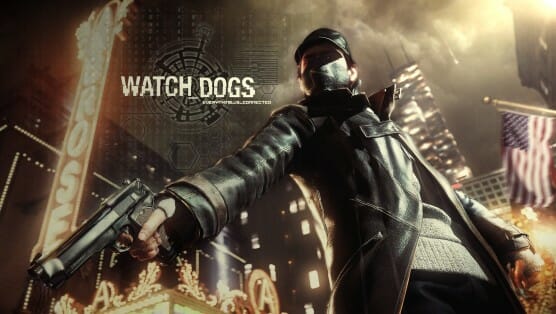Watch Dogs (Multi-Platform)

My partner walked through the room while I was in the middle of playing Watch Dogs and asked “why are you playing Grand Theft Auto again?”
This question perfectly encapsulates the experience of playing through Watch Dogs both mechanically and narratively. The core loop of the game has you doing a lot of the same things that you do in the Grand Theft Auto series, which makes sense; Watch Dogs is a giant open-world game that prides itself on being a faithful recreation of Chicago and the surrounding areas. Like all open-world games, you have to somehow figure out how to fill up all of that space.
Of course, the Rockstar formula is to create small sequences of missions around “zany” characters paired with lots of locations to do totally banal minigames like poker, bowling and racing. Watch Dogs ditches the side characters for sporadically placed missions where you can kill “fixers” (the digitally-connected hitmen that populate every William Gibson novel,) flush out gangs or hack into secure locations. Beyond these side missions there are also online missions where you can compete head-to-head with other Watch Dogs players.
However, the cost of populating this giant true-to-life world map with all of these small events is that they are, at best, small diversions in a massive landscape. Most of my time in Watch Dogs was spent driving from borough to borough dead-eyed while I listened to the passable in-game music and avoided traffic. Sometimes I was chased by the police or by fixers and I hacked into the traffic systems, steam pipes and spike strips of the postindustrial technological city in order to cause huge traffic pileups and the Hollywood incapacitation (but not death) of villains and cops alike.
The driving around and doing whatever you want part of Watch Dogs isn’t the selling point of the game, and those additional pieces of world filling aren’t what has made this game the most preordered title of all time. What’s generated massive hype for Watch Dogs is the narrative we’ve been sold since it was announced. This narrative has been advertised so hard that even I, a person who has purposefully tried to remove himself from the PR machine of games by avoiding all previews of any sort, knew that Watch Dogs was about surveillance and one man’s journey to stop evil corporate overlords from taking over something that was never quite clear.
After playing the game, I’m still not exactly clear what pained white man protagonist Aiden Pearce spent all of that time doing. The game’s story is one full of tropes familiar to anyone who knows their contemporary blockbuster videogames: Aiden Pearce is a boots-on-the-ground hacker connected to a vast criminal underworld. He makes a powerful enemy. This enemy uses the shadow network of hackers and fixers to reach out and teach Pearce a lesson that results in the death of his niece. Armed with a passionate vengeance, Pearce sets out to find whoever was responsible for this act (and when the climax of the game came around and revealed who the villain was I literally laughed out loud.)
With his justification neatly in place, Pearce goes on mission after mission, hacking and serial-killer narrating his way, Punisher-style, through a labyrinthine series of plot points. The crucial engine that drives the game is data and what one can do with it. While I’ve mentioned hackers several times already, I’ve not yet addressed near-future Chicago’s “ctOS,” the thing that everyone is so interested in hacking into. ctOS is a network that quite literally runs the city, logging everything from the private data of individuals to the grand political yearnings of the entire population. This system gets kicked around more times than a soccer ball in the narrative, sometimes being minimally under Pearce’s control and sometimes being under the persuasions of various other hackers.
